We may earn a commission if you make a purchase through the links on our website.
The Best Dynamic DNS Providers
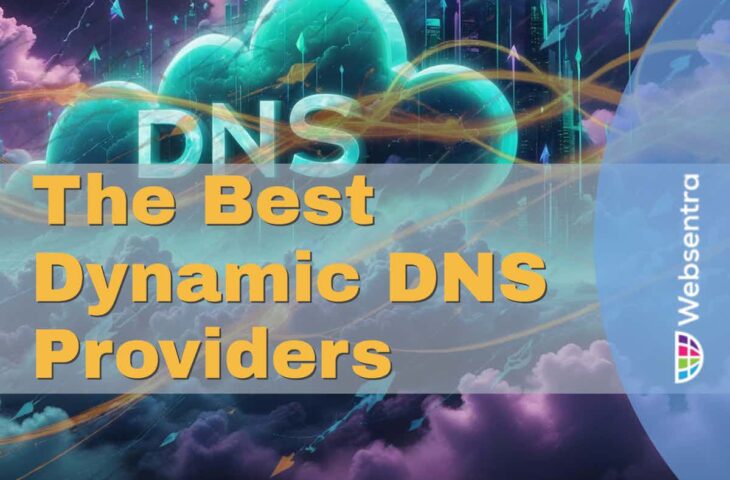
UPDATED: August 13, 2024
Dynamic DNS (DDNS) service providers are essential in allowing users to control their dynamic IP addresses and establish stable connections for remote access to devices and networks. As the demand for remote access and online connectivity grows, selecting the correct DDNS service becomes critical for both consumers and organizations. However, not all DDNS services are created equal, and it is essential to consider certain factors to ensure a reliable and effective solution.
Here is our list of the best Dynamic DNS Providers:
- Dynu Offers free and paid DDNS services with a user-friendly interface, robust security options, and support for a wide range of devices and routers.
- No-IP Provides both free and affordable paid plans, ensuring easy access to your devices with reliable dynamic DNS solutions and customizable hostnames.
- DuckDNS A free DDNS provider that focuses on simplicity, making it an excellent choice for users looking for a hassle-free setup for their dynamic IP addresses.
- ChangeIP Offers dynamic DNS services with various advanced features, such as email forwarding and URL redirection, at affordable prices.
- FreeDNS A straightforward and free dynamic DNS provider that delivers reliable services without the need for creating an account.
- Namecheap Apart from being a domain registrar, Namecheap also offers dynamic DNS services for its customers, ensuring seamless management of dynamic IP addresses and domain records.
In this article, we will discuss the key aspects that users should look out for when evaluating Dynamic DNS providers.
- Ease of Use and Setup A fundamental consideration when choosing a DDNS provider is its user-friendliness and ease of setup. The ideal provider should offer a straightforward and intuitive interface, making it accessible to users of all technical levels. A seamless setup process, including clear instructions and documentation, will ensure that users can quickly and efficiently link their dynamic IP addresses to their hostnames without unnecessary complexity or frustration.
- Reliability and Uptime The reliability of a DDNS service is of utmost importance, as it directly impacts the accessibility of devices and networks. A trustworthy provider should boast high uptime rates, minimizing the risk of downtime and ensuring that remote access remains consistently available. User reviews, service-level agreements (SLAs), and historical performance data can provide insights into a provider's reliability.
- Security Measures The security of DNS records and user data is critical, especially for business users who need to safeguard sensitive information. A reputable DDNS provider should offer robust security measures, such as encrypted updates and authentication options like two-factor authentication (2FA). Additionally, features like domain lock and password protection contribute to preventing unauthorized access and potential security breaches.
- Update Frequency and Methods The efficiency and responsiveness of a DDNS service depend on how frequently it updates dynamic IP addresses and the available update methods. Providers that offer various update options, such as HTTP, DNS, or email, allow users to choose the method that best suits their needs and network setup. Frequent updates are particularly crucial for users with dynamic IP addresses that change frequently.
- Plan Flexibility and Pricing DDNS providers typically offer a range of plans, including free and premium options. Evaluating the features and limitations of each plan will help users determine which one aligns best with their requirements. A provider that offers flexible plans and transparent pricing, without hidden fees, allows users to scale their DDNS solution as needed without unexpected costs.
The Best Dynamic DNS Providers
1. Dynu
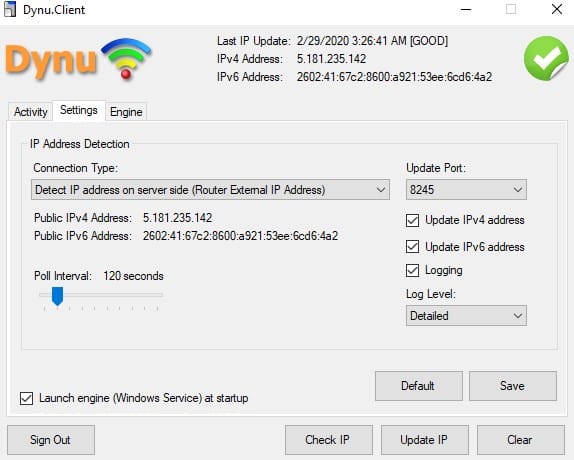
Dynu's broad collection of capabilities, user-friendly interface, and dependability in enabling uninterrupted remote access to devices and networks set it apart from other suppliers. Dynu's flexible pricing plan, which caters to a wide spectrum of consumers, is one of its notable characteristics. They provide both free and paid options, making them available to people and enterprises of all sizes. The free plan is ideal for personal use and includes support for up to four hostnames, making it perfect for managing numerous devices with dynamic IP addresses for free.
Key Features:
- Flexible pricing with free and premium plans.
- Broad device and router compatibility.
- User-friendly and intuitive interface.
- Robust security with various authentication methods.
Dynu's premium plans provide a multitude of perks for customers looking for more advanced features. Users of the premium service can benefit from extra hostnames, round-the-clock customer support, and sophisticated security solutions to protect their DNS records. This all-encompassing strategy ensures that users may select a plan that meets their unique requirements and budget. Dynu also excels at supporting a wide range of devices and routers. Dynu's dynamic DNS services are compatible with a wide range of platforms, including desktop PCs, smartphones, routers, and Internet of Things (IoT) devices, and the setup process is simple.
Dynu's user interface is notable for its simplicity and intuitiveness. The dashboard makes it simple to change DNS records and manage hostnames by providing quick access to critical settings. Furthermore, the service provides dynamic DNS clients for several operating systems, making it easier for non-technical customers to keep their IP addresses current.
Another major feature that distinguishes Dynu from its competitors is its emphasis on security. The service offers a variety of authentication techniques, such as API tokens, password-based authentication, and OAuth, to ensure that only authorized users can edit DNS entries. This degree of protection is critical for safeguarding sensitive data and preventing unauthorized access to devices and networks.
2. DuckDNS
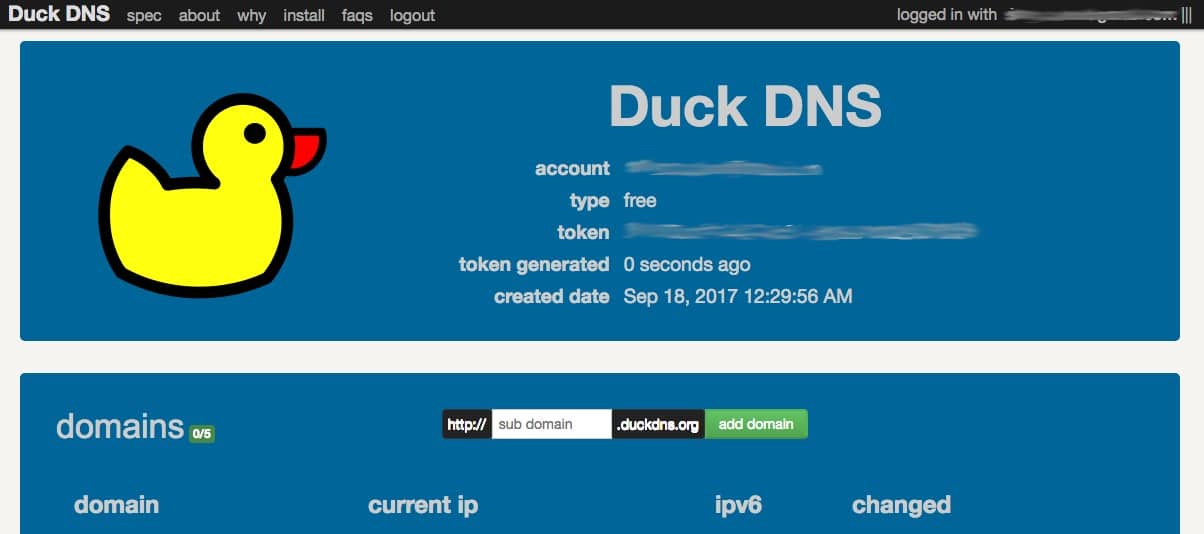
DuckDNS is a distinctive and user-friendly Dynamic DNS (DDNS) provider that sets itself apart from others in the market through its simplicity and specialized approach. With a focus on hassle-free dynamic IP address management, DuckDNS offers a straightforward solution for users seeking seamless remote access to their devices and networks.
Key Features:
- Free service without premium plans.
- User-friendly and straightforward setup.
- High reliability and uptime.
- Community-driven and open source.
The primary feature that differentiates DuckDNS from its competitors is its no-frills approach to dynamic DNS services. Unlike some providers that offer both free and premium plans with varying features, DuckDNS provides its service entirely free of charge. This makes it an attractive option for individuals and organizations on a tight budget or those who require basic DDNS functionality without additional costs.
Another standout aspect of DuckDNS is its user-friendly interface and straightforward setup process. Users can quickly register a hostname of their choice, and DuckDNS provides detailed instructions for updating their dynamic IP address using various methods, including scripts and routers. This simplicity makes it an ideal choice for users who want to get up and running with minimal configuration and technical expertise.
DuckDNS also prides itself on its reliability and stability. The service has a strong track record of uptime, ensuring that users can consistently access their devices and networks without interruptions. This reliability is crucial for users who rely on remote access for critical tasks, such as home automation or server management.
Moreover, DuckDNS stands out due to its community-driven nature. The service is not only free but also open source, relying on contributions and donations from users to sustain its operations. This community-driven approach fosters a sense of collaboration and mutual support among users, creating a vibrant and engaged user base.
3. No-IP
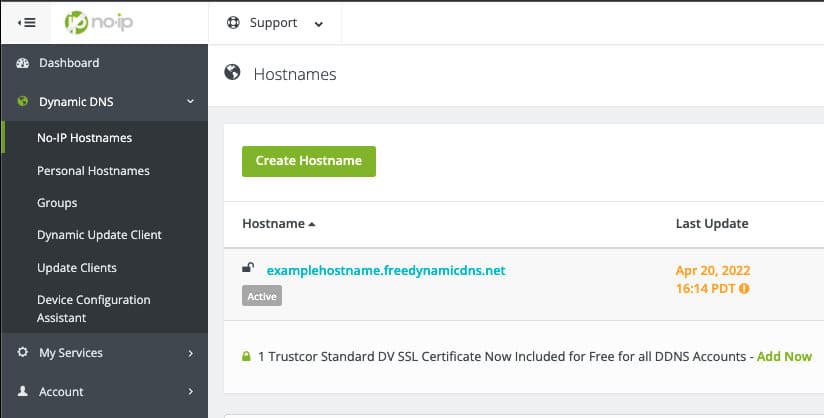
No-IP provides a seamless experience for both personal and business customers, with a focus on convenient remote access and device control. One of the primary elements that distinguishes No-IP is its dual offering of free and low-cost premium services. The free plan is designed for people who only need basic DDNS services and allows them to create up to three hostnames for free. This is especially handy for home users who require remote access to their equipment without incurring additional costs.
Key Features:
- Free and premium plans with hostname support.
- Wide device and router compatibility.
- User-friendly and easy setup interface.
- Strong security with multiple authentication options.
No-IP's premium subscriptions offer numerous advantages to advanced users and companies. Premium users benefit from increased freedom and professional assistance when managing their dynamic IP addresses because they can create an infinite number of hostnames and have access to priority services. Premium users can also make use of custom domains, which add a professional and branded touch to their remote access solutions.
No-IP takes pride in its user-friendly design, which makes it accessible to both tech-savvy persons and newbies. The setup process is simple, and the dashboard makes it simple to maintain DNS records, update IP addresses, and configure settings. This ease of use is critical since it offers a seamless and trouble-free experience for individuals who may lack substantial technical understanding.
Another notable feature of No-IP is its broad compatibility with a wide range of devices and routers. No-IP's dynamic DNS services are designed to work seamlessly across several platforms, whether customers need to manage PCs, Macs, cellphones, or even internet-connected devices like security cameras. This adaptability means that users may access and control all of their devices remotely, regardless of device type or operating system.
Furthermore, No-IP prioritizes security to protect user data and privacy. The service provides safe updates and supports multiple authentication methods such as passwords and tokens. This ensures that only authorized users can make changes to DNS records, preventing unwanted access and any security breaches.
4. ChangeIP
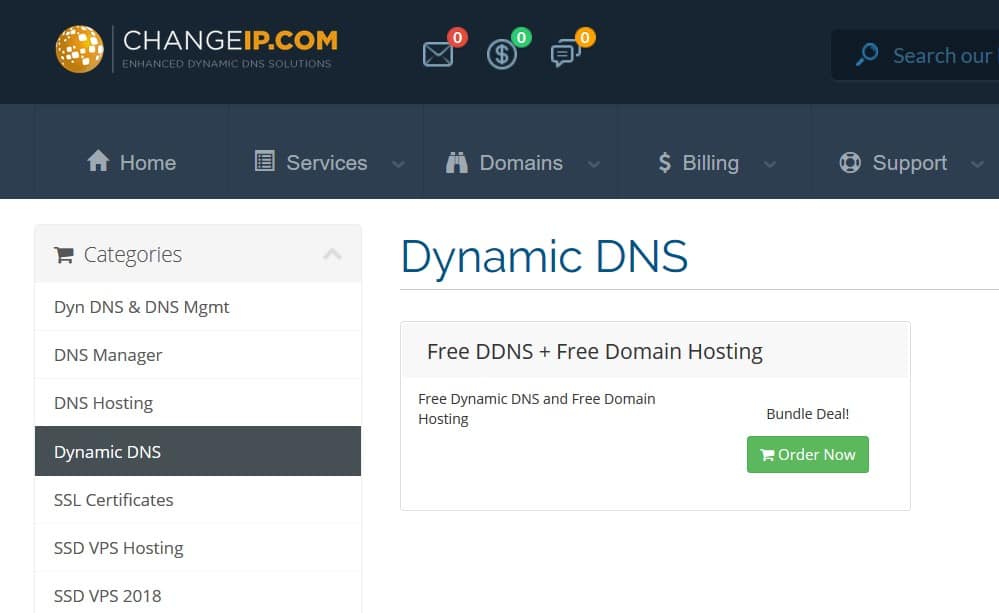
ChangeIP is a versatile and feature-rich Dynamic DNS (DDNS) provider that distinguishes itself from the competition with a diverse set of offerings and customizable choices. ChangeIP provides an all-encompassing solution for managing dynamic IP addresses with a wealth of unique features, with a focus on adapting to various user needs.
Key Features:
- Extensive range of dynamic DNS plans.
- Additional services like email forwarding and URL redirection.
- Robust customer support through various channels.
- Competitive pricing with added value.
One of the primary aspects that distinguishes ChangeIP is its vast selection of dynamic DNS plans. Unlike other providers that may provide restricted options, ChangeIP provides users with a range of plans, each tailored to unique needs. Users can choose a plan that best meets their needs and budget, ranging from basic free plans with limited hostnames to premium plans with extensive capabilities, making ChangeIP suited for both personal and business use cases.
Furthermore, ChangeIP goes above and beyond conventional dynamic DNS capability, which is uncommon among DDNS providers. Users can use services such as email forwarding and URL redirection to consolidate their online presence and control different aspects of their web presence under one roof. ChangeIP is a comprehensive option for those looking for more than just a standard dynamic DNS service because of its holistic approach.
Another noteworthy feature of ChangeIP is its dedication to customer support. The service offers detailed documentation, guidelines, and videos to help users efficiently set up and debug their dynamic DNS configurations. Furthermore, ChangeIP provides customer support via a variety of channels, including email and phone, guaranteeing that users can get help when they need it. This degree of assistance distinguishes ChangeIP by displaying a commitment to user success and pleasure.
Furthermore, ChangeIP distinguishes itself by emphasizing price without sacrificing quality. While some DDNS providers may provide low-cost plans with fewer functionality, ChangeIP achieves a balance by offering cheap pricing for their full suite of services, which includes extras like email forwarding and URL redirection. This makes ChangeIP an appealing alternative for users looking for a good return on their investment.
5. FreeDNS
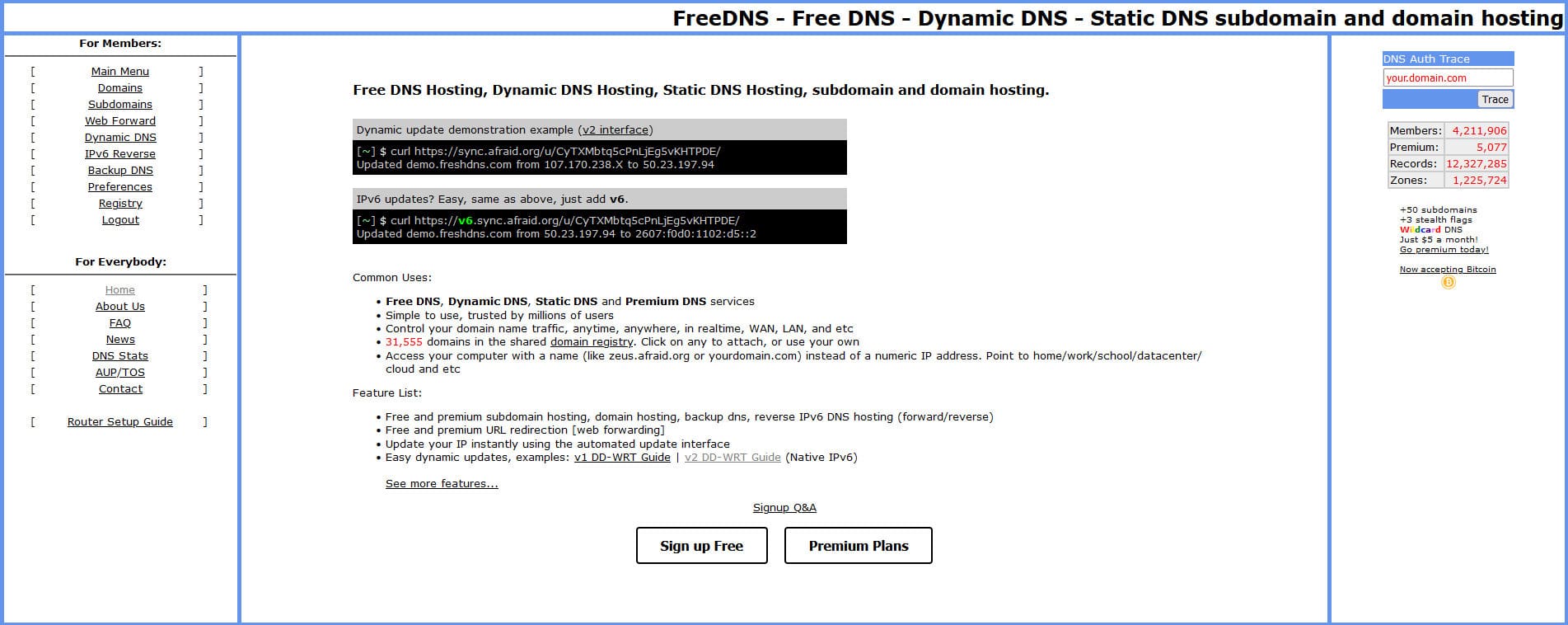
FreeDNS is a plain and no-frills Dynamic DNS (DDNS) solution that distinguishes itself from competitors by its simplicity and concentration on essential functions. As the name implies, FreeDNS provides its dynamic DNS services for free, making it an appealing alternative for those seeking a simple and cost-effective solution for controlling their dynamic IP addresses.
Key Features:
- Completely free service without premium plans.
- Minimal setup and user-friendly interface.
- Straightforward, no-frills approach to DDNS.
- No forced advertisements for users.
The key feature that differentiates FreeDNS from other providers is its commitment to providing a completely free service. While some DDNS providers may offer both free and premium plans, FreeDNS stands out by offering its services without any cost or limitations. This makes it an excellent choice for individuals or small-scale users who don't require advanced features and want to avoid any subscription fees.
FreeDNS stands out for its simplicity and ease of use. Users can rapidly create an account and register their desired hostname, with no difficult configurations or additional payments required. This ease of use makes it an excellent alternative for consumers that value a hassle-free experience and want to get started quickly without any technological difficulties.
Another distinguishing feature of FreeDNS is its no-nonsense approach to dynamic DNS services. The service's primary focus is on providing the basic capabilities of maintaining dynamic IP addresses and associating them with custom hostnames. This uncomplicated method ensures that users obtain a dependable and effective DDNS service without extraneous frills.
Furthermore, FreeDNS distinguishes itself through the absence of forced ads. While some free services may recoup their costs by displaying adverts to users, FreeDNS does not. This implies that consumers can visit their hostnames without being interrupted by invasive advertisements, improving the user experience and preserving a clean and professional appearance for their websites or applications.
6. Namecheap
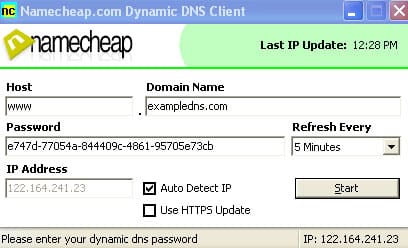
Namecheap is a diverse and trustworthy supplier recognized for its domain registration services, but it also provides a Dynamic DNS (DDNS) solution that distinguishes itself from others by integrating and managing domain records and dynamic IP addresses seamlessly. Namecheap offers a comprehensive solution for individuals and businesses looking for a unified and user-friendly experience, with a focus on giving an all-in-one platform for domain and DNS management.
Key Features:
- Seamless integration with domain registration.
- Wide range of domain extensions.
- Robust security options for domains.
- User-friendly interface with great support.
One of Namecheap's DDNS service's notable characteristics is its seamless connection with domain registration. Users who have registered their domains with Namecheap can effortlessly connect their dynamic IP addresses to their domains, removing the need for separate DNS providers. Namecheap's integrated approach streamlines the setup and management procedure, making it an appealing alternative for users that value convenience and a consistent user experience.
Namecheap also provides a diverse selection of domain extensions (TLDs). This broad range of options enables users to build unique and professional domain names that complement their branding or personal personality. Users can link these custom domains to their dynamic IP addresses using the DDNS service, ensuring easy access to their devices and networks via personalized hostnames.
Namecheap is also notable for its strong security features. To protect domain records and prevent illegal access or domain transfers, the service includes features such as two-factor authentication (2FA) and domain lock. This dedication to security guarantees that consumers can rely on Namecheap to protect critical information while still maintaining control over their domains and DDNS configurations.
Namecheap provides exceptional customer service and a simple user interface. The platform provides extensive documentation and guidelines to assist users in efficiently setting up and managing their DDNS installations. Furthermore, Namecheap's user-friendly dashboard enables smooth DNS record administration, making it accessible to users of all technical levels.